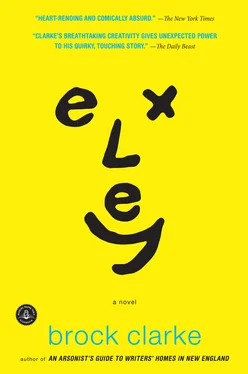“I’m not hungry,” I said. I started walking out of the room. Most kids would do this, expecting, hoping, that their mother would tell them that she was sorry, to come back and please eat something. I might have been that kind of kid, but Mother was definitely not that kind of mother. If I wanted to go to bed without my supper, then she was going to let me. But then I thought of something that had bugged me when I was with my dad at the VA hospital. I turned. Mother was standing over the garbage can with the pot. It was the kind of metallic garbage can with a lid on hinges. The lid was open. I could see the steam coming from the can, and I knew she’d just dumped the macaroni in it. I said: “Would my dad ever have hurt you like the guy with the broken hand hurt his wife?”
“Your father couldn’t hurt anyone in that way,” Mother said. “That’s another reason.” Then she slammed the garbage can lid, went upstairs to her room, and closed the door. I walked over to my dad’s study, lifted the window seat, pulled out the notebook, and wrote down all the stuff that had happened to me that day, and then, on a separate piece of paper, I wrote down another thing my dad had taught me. When I was done, I put the notebook back in the window seat, then went upstairs. When I did, I heard Mother talking. Although I couldn’t hear words, just sounds. “Mumble,” she said, then stopped. “Mumble,” she said again. I took a step closer to her room, then another. When I did, a floorboard creaked. I stood there for a long time, listening, but I didn’t hear anything. Not even a mumble. The door to Mother’s room was closed; I could see from the space underneath that her light was off. I felt like I was hearing things. And if I wasn’t hearing things, then I felt like I wasn’t close to understanding what I was hearing. I felt like I was going crazy, basically. So I walked back downstairs, opened the window seat, and wrote about hearing Mother mumble and feeling like I was going crazy, and I felt better. Maybe that was why Dr. Pahnee wanted me to write down what happened every day: what you didn’t know could drive you crazy, in your head, but once you put it down on paper, what you didn’t know seemed more like part of a story you’d figure out later on. Maybe that’s why Exley wrote A Fan’s Notes , too. Maybe that’s why anybody writes anything. Anyway, I went back upstairs. Mother was mumbling again, but it didn’t bother me now. I just walked into my room, closed the door, and went to bed.
Doctor’s Notes (Entry 15)
After my visit to the Public Square, I decide it is time I tackle (figuratively) A Fan’s Notes . I have read twenty or so pages when the telephone rings. I pick up the receiver, but before I can even utter the conventional greeting, M.’s mother says in a low, angry-sounding whisper, “So I hear M. paid you a surprise visit.”
“Hello!” I say. My heart leaps at the sound of her voice and then sinks at the tone of it. “I can’t tell you what we talked about,” I say, because I know, from the tone of her voice, that that’s what M.’s mother will ask me next.
“Right, ” she whispers — growls, rather. “Doctor-patient. ” And then she stops, as though she’s looking for the right word. “Confidentiality,” I say.
“Bullshit, ” she whispers. It’s a whisper that wounds. As my own mental health professional knows, when I am wounded, either I curl into a ball and cry, or I try to wound back, in my own fashion.
“You’re a lawyer,” I say. I remember this from M.’s file. “You couldn’t tell me what you said to your clients any more than I could tell you what I said to mine.”
“Bullshit, ” she whispers again. M.’s mother has quite a mouth — a mouth and, indeed, a vocabulary . “Just tonight I told M. about one of my clients. Right before he told me what you told him to ask me.”
“What?” I say, and she repeats what she’s just said. “No, no,” I say. “I heard what you said. But what did M. tell you I’d told him to ask you?”
She tells me what M. told her I told him to ask her, and she also describes the discussion that followed, including her well-reasoned argument why M.’s father could not possibly be in Iraq. But back to the matter at hand: M. has misrepresented me to his dear mother. Why, you little. , I think but do not say. “I can’t tell you what I said to M. or what he said to me,” I say. “But I can tell you what I didn’t say to him. And I didn’t say to him what he told you I said to him.” I do not say more, but I do not have to: she “gets it.”
“Oh,” M.’s mother whispers. But it is a softer whisper, a more fragile and lonely one. It makes me want to give her something. The best thing I could give her, of course, is her son’s mental health. “I can’t tell you what M. and I talked about,” I say. “But I do wonder if you could help me.”
“How?” she asks. I can tell by her voice that she really wants to know.
“Well,” I say. I think of all the ways she could help me, professionally. I don’t feel I can tell her about H.’s being struck by the man in front of the Crystal, or seeing M. kick the man in front of the Crystal, or seeing M. in the Crystal itself, or even about the man at the Veterans Affairs hospital, especially since I don’t yet know, definitively, who that man is. Besides, it sounds as though M.’s mother has worries enough, and I don’t want to add to them unless I have to. But perhaps she can help me clear up some other mysteries. “Do you know anyone named K.?”
“What do you mean?” she says.
“I mean, do you know anyone by that name?” I say, and then I spell it for her. “K-a-y.” While spelling it for her, I realize that M. himself did not spell the name for me, in the same way he does not spell the name of his teacher or his classmates. I had assumed — assumed and, indeed, been operating under the assumption — that M. knew that mental health professionals only use initials in their note taking, for anonymity’s sake, and that he was simply helping to facilitate the process. Except, I assumed, in the cases of Exley, his mother and father, and this K., whose names were too important for M. to bear to abbreviate them. It did not occur to me, until just now, that M. speaks in initials , just as he speaks in “blanks,” just as he says “Mother” and “my dad.” Just as Exley, I realize, sometimes uses initials in the first twenty pages of his book. You fool , I think but do not say. “Or perhaps a woman whose first name begins with the letter K? ” I say to M.’s mother.
“No,” she says, and then pauses. I try to read her silence, which is as difficult on the telephone as it is in person. “Shit,” she finally says.
“Wait,” I say, but she doesn’t, and she hangs up, leaving me alone again. That’s the way I feel — alone — without her voice cursing at me; alone except for the book, which I begin to read. I am still reading an hour later when the phone rings again. I pick up, and this time M.’s mother gives me an opportunity to utter the conventional greeting before saying, “I’m sorry for hanging up on you again.”
“No apologies necessary,” I say.
“Maybe not,” she says. “But I’m apologizing anyway.”
“In that case, apology accepted,” I say, and wonder if this sounds as “suave” to her as it does to me. I consider apologizing myself for mentioning K. But if I do so, then I fear, inevitably, that it will lead me to wonder aloud who this K. is again. If that happens, I fear it will result in M.’s mother’s hanging up on me again. Oh, unhappy result! And unnecessary, too. Because I have a hunch: I know that K. is a woman, and I know she was M.’s father’s student, and I know M.’s mother hung up on me when I mentioned her initial. My hunch is that M.’s father has had an affair with this K., and that M.’s mother knows it and that M. knows it, too, and, for his own reasons, is having his own affair with her, in his head and in his own fashion. Sometimes the world is not so complicated. But until I have proof, I will remain silent. If M. has taught me anything, it’s that my silence suits me.
Читать дальше












